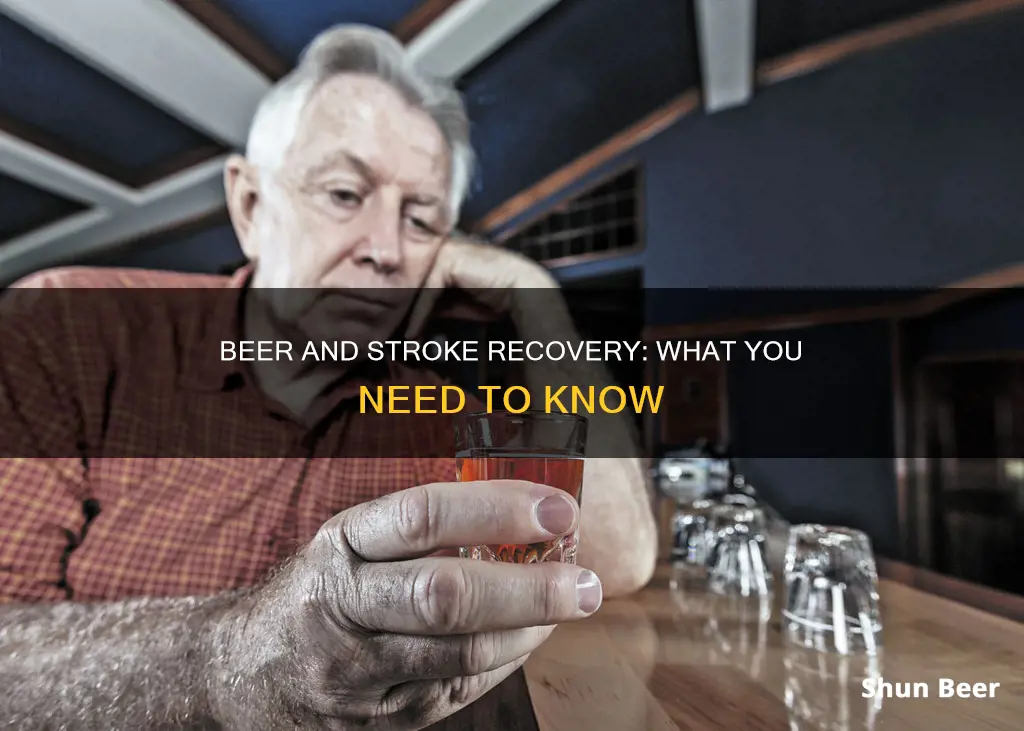
Drinking alcohol is a common social activity, but it can have negative health effects, especially for those who have had a stroke. Alcohol consumption can increase the risk of a stroke by contributing to high blood pressure, type 2 diabetes, and being overweight. After a stroke, it is generally not recommended to drink, as it can increase the risk of another stroke and worsen existing issues such as speech problems, fatigue, and depression. While some people may continue to drink in moderation, it is important to consult a doctor first, as alcohol can interfere with medications and affect recovery.
| Characteristics | Values |
|---|---|
| Drinking alcohol after a stroke | Not recommended |
| Alcohol's effect on stroke survivors | Increases vulnerability to adverse effects of alcohol abuse, including cognitive problems impacting memory, mobility, and speech |
| Alcohol and medication | May interfere with medication, especially blood-thinning medication |
| Alcohol and weight | May contribute to weight gain, which is a risk factor for stroke |
| Alcohol and diabetes | May increase the risk of diabetes, which is linked to an increased risk of stroke |
| Alcohol and atrial fibrillation | May increase the risk of atrial fibrillation, a type of irregular heartbeat linked to an increased risk of stroke |
| Alcohol and high blood pressure | May increase blood pressure, which is the most important risk factor for stroke |
| Alcohol and recovery | May worsen depression and other mental health conditions common after a stroke |
What You'll Learn

Alcohol can increase the risk of another stroke
High blood pressure is the most important risk factor for stroke, contributing to around half of all strokes in the UK. Drinking too much alcohol raises your blood pressure. If you have had a stroke, it is recommended that you do not drink alcohol for at least three weeks. Alcohol can also trigger atrial fibrillation, a type of irregular heartbeat that is also linked to an increased risk of stroke.
Alcoholic drinks are very high in calories, so drinking large amounts of alcohol can make it difficult to maintain a healthy weight. Being overweight is another risk factor for stroke. Alcohol also increases the risk of developing type 2 diabetes, which is also linked to an increased risk of stroke.
If you have had a stroke, you may be more vulnerable to the negative effects of alcohol abuse. Alcohol can worsen mood swings and depression, which are common after a stroke. It can also affect your memory, mobility, and speech, and make you feel fatigued and unwell.
Beer and Antibiotics: A Safe Mix?
You may want to see also

Alcohol can negatively impact your recovery
Drinking alcohol after a stroke is not recommended as it can increase your risk of having another stroke. Alcohol negatively affects your recovery by exacerbating the changes to your speech, thinking, vision, and balance caused by your stroke. It can also worsen fatigue, mood swings, and depression, which are common after a stroke.
Firstly, alcohol increases your blood pressure, which is the most important risk factor for stroke. High blood pressure contributes to around half of all strokes in the UK. By raising your blood pressure, alcohol consumption increases your risk of having a stroke or another stroke.
Secondly, alcohol can trigger atrial fibrillation (AF), a type of irregular heartbeat that is also linked to an increased risk of stroke. If you already have AF, alcohol causes more frequent episodes, further elevating your stroke risk.
Thirdly, alcohol consumption is associated with weight gain and makes it challenging to maintain a healthy weight. Being overweight is another risk factor for stroke, and alcoholic drinks tend to be very high in calories. Therefore, drinking alcohol can indirectly increase your risk of having another stroke by making it difficult to maintain a healthy weight.
Additionally, alcohol can interfere with some medications, including blood-thinning medicines such as warfarin. Drinking alcohol while taking these medications can lead to adverse side effects, including headaches and dizziness. It is crucial to consult your doctor or pharmacist to understand how alcohol may interact with your specific medications.
Finally, alcohol can worsen the cognitive problems caused by a stroke, impacting your memory, mobility, and speech. After a stroke, the brain becomes more sensitive to the effects of alcohol, and many survivors find that their tolerance to alcohol decreases. As a result, the negative effects of alcohol on cognition, memory, mobility, and speech can be more pronounced, hindering your recovery process.
Chugging Beer: How Fast Can You Go?
You may want to see also

Alcohol may interfere with medication
Additionally, alcohol can worsen the side effects of certain medications and increase the vulnerability to adverse effects, such as cognitive problems impacting memory, mobility, and speech. It can also enhance feelings of fatigue and negatively affect overall well-being.
If you are taking any medication, it is crucial to discuss alcohol consumption with your doctor or pharmacist to ensure safe and responsible drinking. They can provide guidance on the amount of alcohol that is safe for you to consume, taking into account your medication and overall health condition.
Remember, drinking alcohol after a stroke can increase your risk of having another stroke and may hinder your recovery. It is always a good idea to seek individual advice about alcohol consumption from a healthcare professional.
Walking Your Dog With a Beer: Is It Legal?
You may want to see also

Alcohol can worsen symptoms like poor balance or speech problems
Drinking alcohol after a stroke is not recommended as it can increase your risk of having another stroke. Alcohol can also worsen symptoms like poor balance or speech problems.
After a stroke, the brain can become more sensitive to the effects of alcohol, which can cause cognitive problems that impact memory, mobility, and speech. If you are experiencing poor balance or speech problems after your stroke, alcohol may make these symptoms worse.
Alcohol can also worsen mood swings and depression, which are common after a stroke. It can affect your memory and thinking, and make you more dehydrated, which can worsen headaches.
If you are taking medication for your stroke, alcohol may also interfere with its effectiveness. It is important to discuss your alcohol consumption with your doctor, especially if you are taking blood-thinning medications such as warfarin.
It is generally advised to reduce your alcohol intake to lower your risk of having another stroke and to minimize the negative impacts on your health and recovery.
If you feel that you are drinking too much or are unable to control your drinking, it is important to seek help from your doctor or local alcohol support groups.
CBD Oil and Beer: Is It Safe to Mix?
You may want to see also

Alcohol can cause weight gain, increasing stroke risk
Alcohol consumption is a contributing factor to weight gain and being overweight increases the risk of having a stroke. Alcoholic drinks are typically very high in calories and can make it challenging to maintain a healthy weight. The high calorie content of these drinks can lead to weight gain, which is a significant risk factor for stroke. Therefore, reducing alcohol intake can help individuals achieve and sustain a healthier weight, thereby lowering their chances of experiencing a stroke.
Alcoholic beverages are often high in calories, and regular consumption can hinder weight management. Alcoholic drinks contain a substantial amount of calories, which can accumulate quickly, especially when consumed in large quantities. For instance, a standard pub measure of wine, which is typically 175 ml, constitutes one standard drink. However, it's important to note that the average glass of wine served in restaurants and pubs is larger, usually around 150 ml. As a result, it's easy to exceed the recommended limits without realising it.
The high calorie content of alcoholic drinks can significantly contribute to weight gain. These drinks often provide little nutritional value, and the excess calories can lead to an unhealthy weight. Additionally, alcohol can interfere with medications commonly taken to reduce the risk of stroke, such as blood-thinning medications like warfarin. This interference can further increase the risk of stroke. Therefore, it is crucial to consult a doctor or medical professional to determine if it is safe to consume alcohol and, if so, what amount is considered safe.
Furthermore, drinking alcohol can worsen the negative effects of a stroke, such as depression and other mental health issues. It can also exacerbate cognitive problems, including those related to memory, mobility, and speech. Alcohol consumption can also enhance feelings of fatigue and negatively impact overall wellbeing. Therefore, it is generally recommended to limit alcohol consumption to reduce the risk of stroke and maintain optimal health.
To summarise, alcohol consumption can lead to weight gain, which increases the risk of stroke. Alcoholic drinks are calorie-dense, and regular consumption can make it challenging to maintain a healthy weight. As a result, individuals may benefit from reducing their alcohol intake to lower their stroke risk and improve their overall health and wellbeing.
Alcoholics and Beer: One Sip Too Many?
You may want to see also
Frequently asked questions
It is not recommended to drink beer or any other alcoholic beverage after a stroke as it can increase the risk of another stroke. Alcohol can also interfere with medication and increase the impact of changes to speech, thinking, vision, and balance caused by the stroke.
It is important to consult a medical professional about your particular condition. They will be able to advise you on whether it is safe to consume alcohol and how much.
Drinking alcohol after a stroke can increase your risk of another stroke, trigger side effects from medications, and worsen depression and other mental health conditions. Alcohol can also negatively affect memory, mobility, and speech.
This depends on the type of stroke and your individual circumstances. For a hemorrhagic stroke, it is recommended to refrain from drinking alcohol for at least three weeks. In any case, it is important to consult your doctor before consuming any alcohol after a stroke.
Yes, there are several alcohol-free alternatives available, including non-alcoholic beers, wines, and cocktails. These can be a fun way to enjoy a drink without the risks associated with alcohol consumption.







